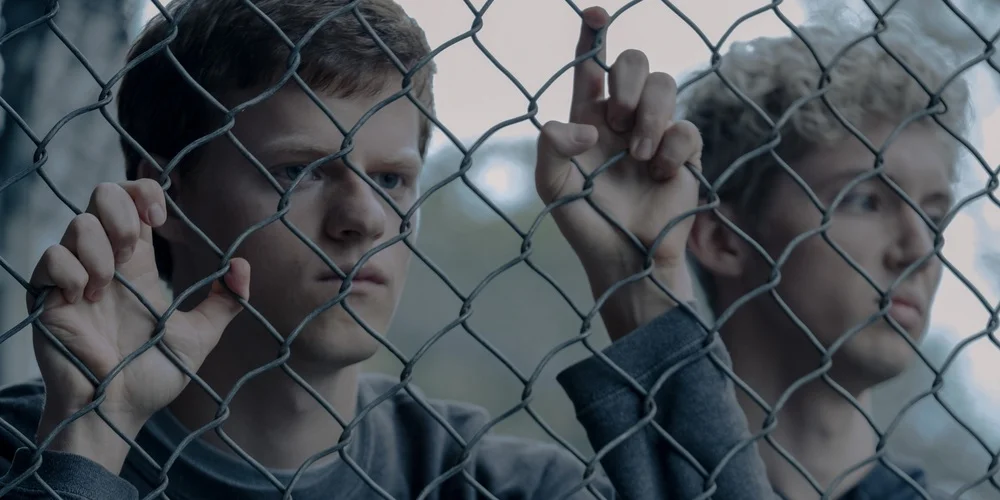Boy Erased
Cold World For Gay Teens In The Christian South
Originally printed in Compass, November 28, 2018.
There was one moment when I laughed during “Boy Erased,” director Joel Edgerton’s sobering adaptation of Garrard Conley’s memoir. The scene is part of a flashback that illustrates how Jared Eamons (Lucas Hedges, “Lady Bird”), a stand-in for Conley, came to enroll in Love in Action, an ex-gay Christian ministry program.
As a freshman in college, Jared befriends genial upperclassman Henry (Joe Alwyn, Taylor Swift’s real life beau), and the former high school jocks take up running together. On one morning run, Henry proposes Jared join him at his church. It’s not so unlikely. Jared himself is the son of a Baptist pastor (Russell Crowe), whose baritone sermons and hefty stature at the podium paint him as an unwavering symbol of fatherly authority for his fundamentalist flock in Arkansas.
Henry’s church, in contrast, is all neon-lit crosses, a Christian rock band, and teenagers bopping around gleefully at the lamest concert conceivable. As Henry beams at Jared, grooving his head back and forth to soft jams about Jesus, the camera pulls back. The two boys, momentarily free from the context of the film’s serious subject matter, appear as exactly what they are — total dopes. A few may have chuckled in the audience, but I was nearly in tears. “I know those guys,” I thought. There is incredible empathy within specificity.
For the rest of “Boy Erased,” the American South is a setting so attuned to conformity that backgrounds take an ominous quality of anonymity. A suburban street of identical brick Tudors; a car dealership with rows of mid-priced sedans, even Jared’s tidy bedroom is a shade of blue so vague it barely commits to its hue. When Henry violently rapes Jared at college one night, hand clasped over Jared’s mouth while he squeals like a wounded animal under the duvet, the camera eventually shifts to the empty hallway outside — white-painted brick and series of identical dorm room doors that stretch on out of frame. How easy it is to pocket away little horrors behind inconspicuousness.
Likewise, Love in Action’s conversion program is intentionally bland. Folding chairs; linoleum tiles; white boys in stiff, white button-downs. Edgerton (also playing the ministry’s inept yet wrathful leader) is clearly more interested in the dour, prison-like setting than the boys who occupy its spaces.
Cooperative to join the program, Jared acts as a somewhat blank stand-in for both the audience and the many young men who have endured conversion therapy’s brutality. Initially, the course focuses on mirroring surface-level traits of American masculinity: standing up straight, gripping a hand with a firm shake, hitting a baseball. It’s a pretense to be mastered, remarks one boy (openly gay pop-singer Troye Sivan), who suggests just doing the work. The eventual evil lies in how accessible the early routines appear, how easy it is to pass your child off to clean-cut strangers.
Without voiceover excerpts from the memoir, Hedges is left to communicate a largely nonverbal struggle, often depicting Jared as searching for a response with a limited well of emotional clarity from which to draw. We can step into his shoes, experience his suffering second-hand, but he does not guide us. The more accessible journey on screen resides within Jared’s mother (Nicole Kidman), a feather-light homemaker who nevertheless knows ridiculousness when she sees it. In the muted tones of Love in Action’s lobby Kidman is so covered in rhinestones her aura seems to glimmer as her clothes catch the light. It is her frivolity, jokes that poke holes at the program’s secrecy, that comes to save her son’s life.
What the interiors of that life will be are left unclear. Years later, Jared lives in an enormous New York City apartment with a multi-ethnic group of friends and the brief hint of a boyfriend, just a guy in a J. Crew sweater stirring pasta. Jared is now a writer, but we never read his work, or find out if he ever followed up with any of the other boys. How he reexamines his experiences with adult eyes is not for us to know.
As a cautionary, yet empathetic tale for parents, “Boy Erased” is firstly a story of tested familial love. Still, it’s the absent particulars of Jared’s life that gnaw away at me. The live-in boyfriend is a signal to tell us that Jared’s “fine.” But how did he ever explain what he went through over a dinner date? Or summon the courage to go on a date? Jared shows a remarkable ability to forgive his parents, but it’s his romantic desire, the very reason he’s punished, that is left erased.
